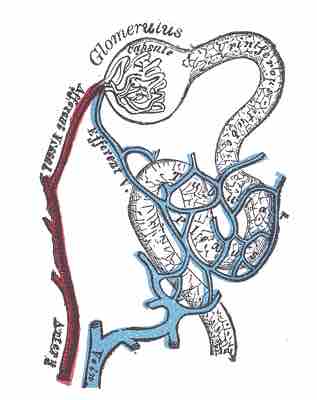The kidneys filter the blood and help remove waste and extra fluid from the body. The kidneys also play an important role in controlling the body's chemical balance. As with other organs, kidney function may be slightly reduced with aging. The kidneys are part of the urinary system, which also includes the ureters and the bladder. Bladder control can be affected by muscle changes and changes in the reproductive system. As the kidneys age, a number of events occur. The number of filtering units (nephrons) decreases. Nephrons filter waste material from the blood. The overall amount of kidney tissue also decreases. The blood vessels supplying the kidney can become hardened, making the kidneys filter blood more slowly . Additionally, changes in the bladder can occur. The bladder wall changes with age. The elastic tissue becomes tough, and the bladder becomes less stretchy. Muscles weaken, and the bladder may not empty completely when urinating.

Distribution of blood vessels in cortex of kidney
As kidneys age, blood vessels harden and blood filtering becomes less efficient.
Under usual conditions, kidney function remains normal in an aging person, although sometimes kidneys in an aging person may function more slowly than those of a younger person. However, illness, medications, and other conditions can affect a kidney's ability to function properly. Changes in the kidneys may affect an elderly person's ability to concentrate urine. Dehydration can occur if an older person reduces fluid intake in an attempt to reduce bladder control problems. Aging also increases the risk for urinary disorders such as acute and chronic kidney failure, urinary incontinence, leakage, or retention, bladder, and other urinary tract infections.
Urinary system cancers are associated with advanced age and are more common in the elderly, especially prostate cancer (men) and bladder cancer.